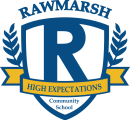Homework Guide
At Rawmarsh, we consider homework to be an important part of the learning process: it allows students to develop their research and independent learning skills, as well as consolidating in-class learning.
However, we also believe in setting homework when it is necessary, relevant and meaningful. There is no point setting homework for the sake of setting it. Therefore, your child may not be set homework on a weekly basis in all subject areas. Instead, their teachers will set homework when they deem it necessary for the pupils’ development. There may be certain times in the school year, e.g. around assessment weeks/mock exams, that homework is targeted revision.
Students should expect to receive feedback on their homework: this may be verbal or written. This feedback should make clear any targets for further development needed.
As students progress through the key stages, they can expect the homework and revision demands to increase, in line with external examinations. By the end of KS4, it is expected that students, as well as completing set homework and revision tasks, will be driving their own learning, by reading widely and often and revising key content and skills.
Homework may be set using a variety of media, including writing essays or producing posters. It may often include using digital formats such as google classroom. Many students with their own Chromebook can access much of this at home. Homework may also be paper based in some subjects to prepare students for the exams that they are set to undertake
For students who do not have access to a computer or the internet at home, we do have within school access to computer rooms and the micro library. For those without a printer at home, Miss Longmore will print off the homework for you in the micro library.
Developing independence and organisational skills are a key component of being successful at Rawmarsh Community School. Pupils are encouraged to record their homework in a way that suits them: google calendars, notes in their phone or even in a notebook. This is designed to increase their independence and ability to note and track their deadlines. We encourage parents to support their child to find a system that works for them.
On a normal week, homework set should not exceed the time limits below.
- Y7 – 1 hour
- Y8 – 1 hour 15 minutes
- Y9 – 2 hours
- Y10 – 4 hours
- Y11 – 4 hours
Work completed at home may take many forms, however you can expect to see:
- Independent projects completed over a longer period of time.
- Research and knowledge retrieval: this may take the form of students finding certain information prior to beginning a topic, or to consolidate and enhance in class knowledge.
- Completing quizzes and questions.
- Completing longer written tasks.
- Acting on feedback from class work.
- Doing exam questions or papers.
- Revision tasks like posters, leaflets, videos and revision cards.
- Learning spellings and key vocabulary.
- Reading quizzes.
- Practical projects.
How parents/carers can help
The support students receive at home can be very beneficial in their progress. It is important to note that ‘support’ is the key word. Too much help can mean students aren’t developing independence, and teachers will find it difficult to accurately gauge the child’s progress if the work is not their own. However, too little can mean work is rushed, incomplete or ill thought through. Below you’ll find some suggestions on how to support your child with their school work. Obviously, this is dependent upon various factors including their age and level of independence:
- Check your child’s homework schedule, perhaps transferring deadlines to a shared notice board, or putting reminders on your phone to check that it’s been done on time.
- Remind them to pack their bag the night before school, to ensure all homework is not forgotten.
- Get them to explain their homework to you before they start. Ask them about checklists for success to ensure they do everything required.
- Get them to plan out how they will approach the homework before they start.
- Check in with the student mid-way through to ensure they are on track.
- Remind them of the importance of using a range of sources for revision, including library research and the internet.
- Ask them to consider their targets from previous home and class work before they start.
- Ask them to teach you something they have covered in class, a powerful tool when revising content.
Problems?
If you or your child encounters any issues regarding their homework, please feel free to contact their teachers for support in the normal way.


Active Citizenship Day
On Friday the 9th of May, RCS students participated in the WPT wide Active Citizenship Day. As part of their personal development journey, each year

